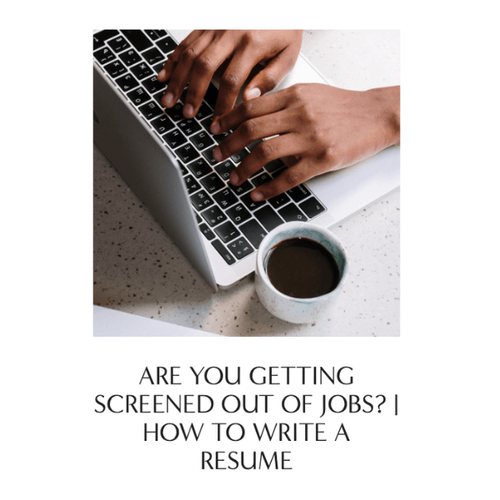Job Search Tips – The Best Job Searching Strategies (Quick)
This is the top no-bs job search tips guide you need now! Make job hunting easier with these fast effective tips!
This post may contain affiliate links, which means I’ll receive a commission if you purchase through my link, at no extra cost to you. Please read the full disclosure here.
As an Amazon Affiliate, I earn from qualifying purchases.

Why Read This Article on Job Search Tips?
There are SO many blogs out there giving you generic job search advice.
If you’re looking for ACTUALLY helpful, FAST job search tips THIS is the place to be.
If you’re in the job hunt, chances are you …
- Feel like no one is responding back to you
- Think no one will hire you with your limited work experience
- Feel like job interviews are overwhelming
- Job descriptions are vague or don’t align with what you want
- Online applications are getting you screened out
- You have no idea what your career goals should be
- Feel that the job market is bleak
… generally, it can feel like the job search process is overwhelming and never-ending, and you’re stressed out.
If this is YOU then (1) I can tell you I have been there and (2) I can tell you HOW to find a job THE RIGHT WAY.
What do I mean by “right way”?
I mean chances are that you were never taught HOW to apply to jobs, why you’re getting screened out/no one is getting back to you, and how to structure your resume.
If you are looking for some insight into resume writing, consider my other post, “How To Write A Resume – The Best Guide”.
I am going to answer all of these questions for you… whether you are in school, a recent graduate, an experienced individual looking for the “right job” or a better job, or you want to change industries…
I can tell you I have done all these things and I will teach you the correct method.
What Is The #1 Job Search Tips Strategy?

DON’T SKIP THIS SECTION THIS IS IMPORTANT.
The number one reason you aren’t getting a job interview, job opportunities, job offers, etc. is not just because “no one is hiring”.
There is a solid chance that you also play a role in the job search and there are opportunities for you to improve.
The number one job search strategy is to consistently and effectively apply to job postings that align with your career goals.
There are multiple pieces to this…
- Is what you are applying to what you are looking for?
- Is how you’re applying to a specific role actually effective and good quality?
It can be frustrating because …
- Yes, there are fake job opportunities out there that workplaces are creating as advertising.
- Of course, there are ineffective hiring managers out there.
- Yes, the job market is competitive and intense.
However, in terms of personal accountability, some people should also consider their part in the slowness of finding a job.
If this isn’t you, great! But if it is consider whether or not you are doing everything you could be when looking for a career change…
Job Search Tips | Questions To Ask Yourself

Please ask yourself these questions to determine how effective you currently are at job hunting! (You might be surprised!)
- Am I applying to jobs consistently?
- Are my applications to jobs specific to them and high-quality?
- Am I following up consistently?
- Am I networking diligently?
- Do I have a proper plan for my career goals or am I just hoping something works out?
- Is my resume good quality not just in terms of experience but in terms of formatting, punctuality, etc.?
- When I apply to a role is my cover letter good quality?
- Am I preparing effectively for the first interviews by practicing common interview questions, body language, practicing communication skills, and making a good impression?
- Am I applying to jobs with a job description way beyond what I should be in terms of the stage of my career?
- Is job searching being treated like a full-time job in terms of priority?
- How does my online presence appear to potential employers?
- Am I learning about companies and their values and structures, or just spamming out a job application every day?
- Do my key skills align with what companies are offering or should I consider getting more certifications, etc.?
- Am I telling a story effectively when explaining my career journey about where I have been and where I want to go?
- Am I getting hung up on job title, salary, industries, or other factors that prevent me from expanding my opportunities or “net”?
Answering these questions can really help you to acknowledge where you can improve in terms of your job hunt.
How To Effectively Do A Job Search?

Now I am going to teach you step-by-step the ENTIRE PROCESS for how you should be applying for jobs the CORRECT WAY.
What Are The 3 Steps For A Successful Job Search?
Let’s break this up into three simple steps for a job search.
Step 1: Preparation
Preparation is an absolutely key step in job hunting which is why this is the biggest of my job search tips.
This is the foundation and is a critical part of the job hunt because if your foundation is bad the job hunt will not be effective.
For example, if your resume is getting blocked because it isn’t ATS-friendly then you likely WON’T hear back from a hiring manager regardless of how consistent you are with applications.
Essentially, you need to prepare before sending out applications.
Step 2: Consistent Applications
The second step is critical in terms of the job hunt.
You NEED to be consistently applying to jobs.
NOT haphazardly applying to things every once in a while.
ACTUALLY applying to companies that match up to you.
NOT following up when you “feel like it”.
Essentially, you need to follow a job search schedule.
Now I know it can be overwhelming!
I’ve been there… that’s why I am going to help you prevent getting stressed and show you how you should be applying.
Step 3: Active Engagement
This is the final step and this involves actually following up when hiring managers reach out, setting up interviews, and properly preparing for them… including proper etiquette.
Essentially, active engagement with the specific company, industry professionals, different industries, industry events, interviews both informal interviews and formal interviews, etc.
Then when there is a job offer or job offers, negotiate for what you deserve and be responsive throughout the process.
Now let’s dive into the specifics of each stage in the job search step by step!
The Best Easiest Job Search Technique (Advice)

You’ve decided or come to the conclusion you need a job, whether it be new, different, or your first…
The first step you need to accomplish is to decide what you want, what you are looking for, what your standards are, and how you will get from point A to point B.
How To Do Proper Job Search Preparation
The first thing you are going to do is to think about what you can do.
Then you are going to physically write down a list of what you can do.
- Maybe you have a degree or some sort of accreditation. Maybe you have certificates.
- Perhaps you just have knowledge about something like coding because you taught yourself as a hobby,
- Maybe you just have transferable skills (time management, problem-solving, leadership, etc.)
- If you have experience in different jobs, regardless of if they are traditional or not.
Whatever you “have” write it down.
These will all be the basis of your resume.
Resumes typically have a few key sections…
Intro/Title/Name/Contact Info – Your Name, Email, Phone Number, Linkedin Address
Experience – Relevant Job Experience (or job experience if it’s limited)
(Optional) Relevant Projects/Experience – additional info on projects or experience you might have (if you’re in school you can add the clubs, etc. you are a part of)
Technical Skills & Qualifications – this might be anything from languages, tools you have experience with or certifications for, etc.
Education/Certification/Knowledge – where you went to school, GPA, etc.
Use This Resume Format
You are then going to start drafting a resume in the following format:
(I have shared this in my blog post “How To Write A Resume – The Best Guide” as well.
- File type: Save your resume as a PDF to ensure that the formatting stays consistent across different devices and programs.
- Font and sizing: Use a professional, easy-to-read font such as Arial, Times New Roman, or Calibri. Stick to a font size of 10-12 points for body text and 14-16 points for headings.
- Color: Stick to black text on a white background for maximum readability. Avoid using too many colors or bright colors that may be difficult to read.
- Bullets: Use bullet points to break up long blocks of text and make your resume more scannable. Aim for at least 3-5 bullet points per job or experience.
- Length: Keep your resume to one page if possible, and only include relevant information. If you have more than 10 years of experience, you may need to use a second page but try to keep it as concise as possible.
- Margins: Use standard margins of 1 inch on all sides to ensure that your resume fits on one page and looks professional.
- White space: Use plenty of white space to make your resume more visually appealing and easy to read. Avoid cramming too much information onto one page.
- Consistency: Use consistent formatting throughout your resume, including font, sizing, and spacing. This will make your resume look more professional and polished.

Create Your LinkedIn
Now you should have a basic draft of your resume.
Then move on to creating a LinkedIn profile if you haven’t already.
Make sure to add a profile phone, description, and background image, and select that you are “Open to Work” on your profile.
Here is LinkedIn’s guide for how to “Let recruiters know you’re Open To Work”
In addition, start connecting with others.
Add your work experience, etc. to act as your digital resume.
If you already have a LinkedIn profile, continue adding to it.
Now you are going to edit both your resume and your LinkedIn using a free tool.
Why? This tool will make sure both are OPTIMIZED so that when they are physically or digitally read/scanned you will look professional and like a good fit.
The tool you will use for this is called “Resume Worded”
This tool is NOT SPONSORED I just truly love it. I used it during my job hunt in 2022 and it made all the difference.
This tool will walk you through how to scan your uploaded resume and your LinkedIn profile.
Once you have improved your scores (the scores are out of 100) it’s time to start bulking it up, especially if you have limited experience.
Go to whatever job search platform you like…
Use Job Search Platforms
Here are some popular job search platforms:
All you need to do is look at job boards in your desired location and search for jobs you are interested in.
For example, if you studied marketing you might search things like “marketing”, “digital marketing”, “SEO”, “market research”, etc.
Then scroll through the open positions and scroll down past the introductory stuff to the job requirements or qualifications section.
This will list things like experience required, technical skills, and “must be” kind of stuff like “must be good with project management” or “must be familiar with data analytics tools”.
What you’re going to do is find job requirements and qualifications sections for jobs that you…
- Are interested in
- Think would actually hire you
- Are relevant to the job you want
Basically what I am saying here is don’t apply to a job that says “manager” if this is your first job out of college.
Then copy the text there and paste it all in your notes somewhere. Save each individually and label them as something like “Digital Marketing job” or “Market Research job”, etc.
What we are doing is determining what roles we are looking for, what they are looking for, and what we can do to optimize ourselves and our resumes to fit them.
Find as many as you choose and keep saving those sections.
Once you have determined you have enough now sort these jobs by type.
Find Out What These Job Types Are Looking For
Create a list of common qualifications you see amongst each type of job.
Figure out what each job type is looking for in an applicant.
If you see that digital marketing jobs are all looking for job seekers who know how to use Google Analytics for example, you can deduce that a good plan for you is to get that certification… which is FREE by the way!
Go to Google Academy to get Google Analytics certified
Compile a list of common certifications, courses, qualifications, etc.
Become More Marketable
Lastly, you are going to take the list of certifications and qualifications and deter
Plan to get them marketable and a good match for each job.
Utilize critical thinking about what is a good way to make yourself the most valuable.
Amongst each job type copy all the text of qualifications and put it all in one document.
These will make you stand out as an applicant and help you get noticed in the job search.
Now we are going to make individual resumes for each job type.
Use A Wordcloud Generator
Then you want to use a Free WordCloud Generator tool to get the top words used amongst each job type.
The larger the word in the word cloud, the more you should use it.
Incorporate each into your resume and make note of which resume is which…
DON’T NAME EACH something like “digital marketing jobs resume”.
Instead, save them locally put them in individual folders labeled something like “Digital Marketing role” or whatever job title is relevant, and name them your first and last name and resume.
Now your resumes (each individualized for the types of jobs you are applying to) and LinkedIn are prepared.
How To Send Out Consistent Applications
The next step is critical. Now that you know what you are looking for, you are going to come up with a plan of how many jobs you are going to apply to in a period of time.
You need to determine how many per day, week, month, etc. because you need to have a goal in order to stay consistent.
If you apply to job sites randomly, it will be a lot harder to stay on top of all your applications and respond back to hiring managers in an appropriate amount of time.
Job listings can change within a day so it is in your best interest to make sure that you are taking the online job search very seriously and following up.
My best advice is to break everything into manageable chunks.
If your goal is 30 applications a month, think about how many that would be per week and per day.
Make sure your goals are manageable and reasonable so that sticking to them is much easier.
Don’t just get hung up on your dream job either. It’s important to diversify your applications. Make sure to write individualized cover letters for every application as well.
Trust me, hiring managers will know if your cover letter is generic.
Job hunting takes up a lot of time so make sure you are structuring your life around it, not the other way around!
How To Have Active Engagement In A Job Search
When it comes to interviews make sure you are preparing for them in advance, practicing with others or in front of a mirror, and making the proper time to actually learn about the company you are applying to.
Remember, you aren’t just applying to any random company. You should genuinely feel that you can fit into their company culture.
Jobs are a huge part of our lives so if you feel like a company is wrong for you or wrong in general save yourself the stress of taking that job. I totally understand the desperation of the job hunt, but just be careful. It can be very transparent even in the hiring process that you don’t want to work for this company.
Make sure to follow up after interviews with respectful etiquette including thank yous and things like connecting on LinkedIn.
In addition, try to be responsive throughout the entire process, even if you aren’t leaning toward taking the job. You never know if you might come across them again.
I hope this article on job search tips was truly helpful to you in understanding how to hunt for a job.
I wanted this to be meaningful advice without all the fluff. In addition, I wanted it to not be generic, but rather tangible and step-by-step.
If you liked this article, consider my other articles on Career Advice!














